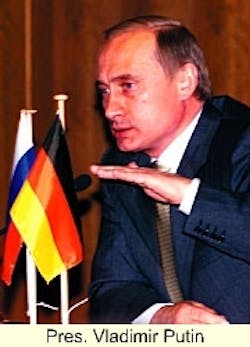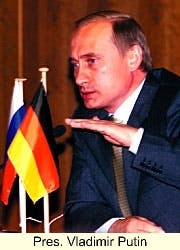New Russian tax code legislation changes expat obligations
Radical changes to the Russian Tax Code, put into place by Pres. Vladimir Putin last August, will soon alter the way in which expatriate workers are taxed within the Russian Federation.
The principle changes include a much lower, flat rate of tax for residents; and a higher tax rate with a broadened liability for nonresidents, who will now be taxed on income attributable to Russian activities, regardless of whether or not payment is made from a source (i.e., a bank account) in Russia.
Oil and gas companies and the service and supply companies that work for them-which together account for one of the largest expatriate worker populations in Russia-face employee scheduling challenges in coping with the changes, in order to garner the maximum tax savings that might accrue.
Changes
Effective Jan. 1, 2001, "tax residents" will be subject to taxes on their worldwide income at a flat rate of 13%, whereas nonresidents will be subject to tax on any Russian-source income at 30%. Currently, foreign employees can avoid paying Russian income tax altogether if they work in Russia less than 183 days and receive their pay from an "offshore," or out-of-the-country, source. After the first of the year, however, expats may have an incentive to do just the opposite.
"The principal technical change is the expansion of the definition of what is Russian-source income," said Michael Kelleher, tax manager for Pricewater- houseCoopers in Moscow. "Previously, this concept had been limited to payments made from a source in Russia, and has been expanded to include any remuneration for the performance of employment or other duties, work performed, service provided, or action performed in the Russian Federation."
Additional changes will also affect dividends, to be taxed at 30% for all taxpayers (subject to relief under the terms of a double-taxation treaty), and specific anti-avoidance measures that will tax certain insurance and bank deposit schemes at a rate of 35%. Foreigners, for the first time, will also now become subject to tax on the following items:
- Housing allowances.
- Compensation for the use of cars for business purposes.
- Business trip per diems in excess of statutory norms (which are extremely low).
In addition, deductions for contributions to foreign state pension and social funds will be disallowed. These changes do not target expats as a group," Kelleher said, "but appear to be consistent with the government's overall intent to develop a more transparent tax system that promotes tax compliance."
Residency
Despite these changes, the definition of a tax resident under Russian law has not been changed. That is, an individual who is physically present in the Russian Federation for more than 182 days in a calendar year-including days of arrival and departure-remains a tax resident.
Thus, taxpayers who are nonresidents in a particular year will no longer be able to avoid a liability for Russian tax on income paid to them during this period by simply having remuneration paid to them from a source outside Russia. Instead, this income will now be subject to tax at 30% under Part II of the Tax Code. There is also no "de minimis provision" that would limit the tax liability of a nonresident.
"This change is likely to be problematic to business travelers into Russia [regional management personnel], as well as to short-term assignees [project managers, technical support personnel], and to rotators, all of whom in the past have legally avoided any interaction with the Russian taxation system by timing their assignments and receiving their remuneration from an offshore source," said Jim Koch, tax partner for Pricewaterhouse- Coopers.
According to Conoco Inc. and Schlumberger Ltd., two companies that have large operations in Russia, the tax-code change will not affect the way these companies conduct business, other than through employee rescheduling. However, this tax-code change will probably affect the amount of time each foreign employee resides in Russia. For example, expat workers may be asked to stay longer than the allotted 182 days, instead of departing earlier.
"A simple planning initiative to manage the changes introduced by Part II is to time the assignment terms of assignees so that they qualify as Russian tax residents during a particular year, and, accordingly, their income becomes taxable at the reduced rate of 13%," Koch said. "It should be noted, however, that a tax resident is liable for tax in Russia on his worldwide income, not just his Russian-source or employment income."
To expedite compliance, a resident taxpayer who receives income from a non-Russian source must attach to his tax return a letter from the offshore entity confirming the amount of income paid. A Russian translation of the letter must also be attached.
Treaty relief
PricewaterhouseCoopers says another potential solution to nonresident tax liability is to seek relief under the terms of an applicable double-taxation treaty. However, there are a number of conditions that must be satisfied before treaty relief becomes available:
- The expatriate must be a treaty resident of a foreign state with which Russia has entered into a double-taxation treaty.
- There must be no recharge of the cost of the expatriate's labor to a permanent establishment that his employer has in Russia.
- A number of treaties require that the expatriate must not have been present in Russia for more than 183 days in any 12-month period commencing or ending in the fiscal year concerned.
"An additional problem with the use of treaties in Russia is that the Russian tax authorities have little experience with requests for such types of relief," Koch said. "Thus the application procedure is likely to be long and difficult, and not necessarily successful, despite the existence of seemingly clear grounds for relief."
Accordingly, it is likely in practice that a number of taxpayers will self-assess their entitlement to treaty relief, rather than formally apply for clearance with the tax authorities. An application will have to be lodged, however, where a refund is sought on treaty grounds-for example, where tax has been withheld and remitted by the employer.
Increased tax revenues
"From an administrative point of view, the broad thrust of Part II is to increase the collection of personal income tax at the source," Kelleher said, "and to decrease the number and type of circumstances in which returns must be prepared and lodged."
As part of this change, expatriates will no longer be required to lodge a preliminary return upon their arrival into the Russian Federation for the first year in which they expect to qualify as a tax resident. And it appears that preliminary installments of the annual income tax liability will not be required throughout the course of the year.
Instead, a tax resident is required to self-assess his or her income tax liability for a particular year, lodge a return by Apr. 30 of the following year, then pay any liability in full by July 15 of that year.
Kelleher notes that expatriates are still required to lodge a final return within 1 month of their permanent departure from the Russian Federation, and to pay any tax liability (as self-assessed by them) within 15 days.
Obligations
"Any offshore employers with no registered presence in Russia will not be required to remit personal income tax," said Koch, "whereas a Russian legal entity that makes salary or similar payments, clearly must."
However, the gray areas under Part II concern:
- The obligation to withhold tax from an offshore employer with a registered presence, but which pays its employees-particularly its expatriate employees-from an offshore payroll.
- Whether the tax authorities will attempt to recharacterize payments for management services made by a Russian permanent establishment or legal entity to an offshore employer of seconded labor, as salary and wages and, in the process, enforce a withholding obligation.
In both these circumstances, the absence of any detailed payroll information would appear to make an obligation to withhold a practical impossibility and, from a technical view, any payment made in these circumstances could not be viewed as a "withholding," under the current provisions of Part II.
Finally, Kelleher and Koch note that a liability to tax in Russia for US citizens is generally no more than a cash-flow or timing issue (although some benefit may arise under the domestic foreign-earned income exclcusion), on the basis that they are taxed again in the US on their worldwide incomes. For expatriates who are not US citizens and who generally break their home-country tax residence when they commence a long-term assignment in Russia, any reduction in their Russian taxation liability is likely to represent a permanent savings.

